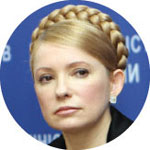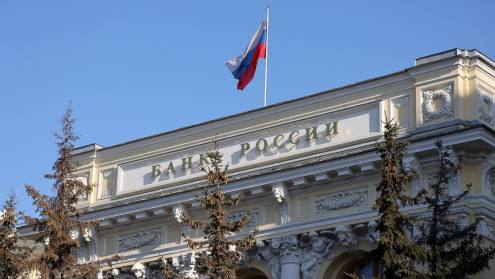
When a run started on a medium-sized Ukrainian bank last October a storm swept through Ukrainian banking. Yesterday’s star-performing economy was brought to earth with a loud thud. The result has been queues outside banks of depositors wanting to withdraw their money, authorities running around in circles seeking to pass laws to restructure the system and a political inferno that threatens to bring down a less-than-stable government.
Fear and loathing continues to stalk Ukraine’s banks. Dramatic consolidation under the aegis of the International Monetary Fund (IMF) will put hundreds of bankers out of work, while the public pours venom – through the columns of Kiev newspapers – on the owners of banks, who are refusing to pay out because they fear collapse.
All are united in criticising the government for its vacillation, contradictory policies and slow response to the crisis. This included a dispute between president Viktor Yushchenko and prime minister Yulia Tymoshenko over an attempt by the government to remove Volodymyr Stelmakh, the governor of the central bank, National Bank of Ukraine (NBU).
Defending the system
|
| Petro Poroshenko, the chairman of the council of the central bank and a local oligarch close to Mr Yushchenko, comes to the system’s defence. “Ukraine has been singled out for attack and criticism,” he says. “This country is badly misunderstood by the markets and international financial community. The banking system has been through instability, but the currency has stabilised and the panic is over.” However, such words of comfort fall on many deaf ears. |
Locally owned banks – in particular those that lack a deep-pocketed parent – have the most to fear. These banks are facing intense pressure from the authorities to beef up their capital, merge with a larger institution or shut down. Many are now resigned to the fact that they will be out of business in the next few months. Some have already gone to the wall, and the bloodletting will be painful.
Andriy Bespiatov, an analyst at Dragon Capital, says: “If the bank is your core business and you have pretty much no other business, then you are the number one target for some pretty big problems.”
Wielding the big stick is the IMF, which is putting Ukraine’s banks through a grilling, the likes of which they have never experienced before. The IMF came to the country’s aid in October 2008, when the banks were threatening meltdown in the wake of a failure of top five bank Prominvestbank. The IMF has since imposed a process of tough analysis on the entire banking system as a condition for its $16.5bn grant to prop up Ukraine’s reserves.
The outcome of this analysis will be a whip-round of parent banks for fresh capital. Their willingness to supply this will determine the future shape of the banking system. Ceyla Pazarbasioglu, the head of the IMF’s mission to Ukraine, says: “Most foreign banks have committed to bring in capital. It would a huge reputational issue if good banks were to leave.”
There remain some doubts in local bankers’ minds whether all foreign banks will wish to recapitalise (and so maintain) their local operations. Ihor Mitiukov, Morgan Stanley’s head in Ukraine and the country’s finance minister from 1997 to 2001, says: “Foreign banks have been slower than the government had hoped in bringing new capital to their local operations.”
Foreign banks who are facing demands for capital from their local subsidiaries include Raiffeisen, which owns Aval, BNP Paribas (Ukrsibbank), Erste Bank (Prestige), Commerzbank (Bank Forum), UniCredit (Ukrsotsbank) and OTP (which, confusingly, owns the former Raiffeisen operation in Ukraine, renamed OTP). Between 35% and 40% of the country’s $120bn-worth of financial assets are on the books of foreign banks but sources believe the local authorities may seek a capital injection of as much as Hr20bn ($2.46bn) from the foreign banks’ parents as the price for staying in Ukrainian banking.
Payback time
Authorities have little time for complaints from foreign banks. One said: “They made a ton of money during the past four years. Now it is payback time.”
The owners of locally owned banks are in a worse state. They are expected to have to find about Hr4bn, a figure likely to be beyond the capacity of many of them. Mr Poroshenko says: “We are realists and we understand that certain banks will have problems. As a result we expect consolidation of the banks.”
The IMF’s Ms Pazarbasioglu confirms: “It was clear to us that the banking sector will have to go through difficult times, first because of the economic contraction, and second because of the global contraction. This is a banking system that has been expanding rapidly over the past four or five years. Credit growth has been between 70% and 100% annually. This means that, when it is very difficult to access the capital markets, they will have to contract.”
The IMF anticipates that the entire system will require Hr44bn-worth of new capital to fill the black hole.
Ukraine’s top 17 banks will have the clearest idea of their future. They were presented with the IMF-inspired analysis of the state of their loan books to private individuals and corporates in January. They were given an indication of their financial viability and of the amount of capital required to fill black holes. The next tier of banks, Ukraine’s second division, were due to receive their IMF report on February 24, after the Banker went to press.
The government and the banks have wasted no time taking an axe to some of the top banks in the wake of the IMF report. Russian bank Vnesheconombank (VEB) has come in to acquire Prominvestbank, one of the country’s largest and best-regarded banks, which had run into trouble even before the crisis. VEB is believed to have paid $1bn for 75% of the bank and may now be on the hook for an unquantifiable amount of non-performing loans (NPLs) in Prominvest’s portfolio. This deal appears at least to have been completed and Prominvest saved in some shape or form.
From Crisis to consolidation
The same cannot be said for Nadra Bank, another top-tier bank, which was put into receivership on February 10 after failing to repay a $100m Eurobond and a $130m syndicated credit. The bank has been unable to raise funds abroad, and the NBU imposed a moratorium on further debt repayments by the bank at the end of February.
The energy tycoon Dimitri Firtash, owner of RosUkrEnergo, had earlier pulled out of an approach to buy Nadra. A much smaller bank, Bank Kiev, had earlier been put into receivership after being unable to pay depositors back.
Mr Poroshenko has warned that a further 15 banks are on the verge of receivership for similar reasons. He says: “The central bank has the legal right to put a bank into receivership if it delays payment to depositors for more than one week. It is obliged to do so if the delay is more than two weeks.”
Another bank known to be facing challenges is Ukrprombank, the Ukrainian industrial bank. PrivatBank, the country’s largest local bank and subsidiary of PrivatGroup (a substantial industrial concern with interests in steel, media and sport) is believed to have looked at acquiring Ukrprombank, as well as other banks.
Such deals would previously have been controversial for a number of reasons. These relate primarily to transparency and governance. For all its size and scale (PrivatBank has some $14bn of assets), its reputation for corporate governance has not endeared it to many in the market. The bank, which seeks to keep a low profile, is not helped by the apparent links between its part-owner Igor Kolomoisky and Ms Tymoshenko.
“Privat does not have clear corporate structures and much of its ownership is hidden in offshore companies, partly to escape anti-monopoly measures,” says Anders Aslund, former adviser on economic reform in the USSR, in his book Evolution in Orange.
Shareholders have also felt badly treated by the bank, says Andriy Bespiatov, an analyst at Dragon Capital. “[PrivatBank’s] corporate governance is an issue,” he says. “The level of its transparency, of its reporting practice, of its treatment of minority shareholders in the company have also been criticised. But its business is developing, which in this current situation is quite something.’”
Some of the larger foreign banks say that they do little business with PrivatBank, and the European Bank for Reconstruction and Development’s (EBRD) Ukraine financial sector projects manager Alexander Pavlov adds: “There are a few integrity issues, and corporate governance issues of which we don’t approve.” No banker questions PrivatBank’s financial performance or strength, however. The bank did not return calls from The Banker.
Controversial deals
The pain now being faced by Ukraine’s banks has its origins in a mushrooming of credit extended to private and corporate borrowers over the past five years. Local banks took advantage of favourable market conditions to raise large sums on the capital markets. About $100bn of credit fuelled a house price and import boom. Raiffeisen Aval for example, notes: “The Ukrainian banking sector was growing more than 50% in terms of total assets. Our bank grew more than 100% in terms of total assets. Now the credit portfolio is flat and we have to work on the quality.”
|
| Before 2008, stock markets in Ukraine raced ahead at a speed beaten only by China. The return to earth will be painful. Andrey Volkov, chairman of the board of Alfa Bank (Ukraine), says: “The loan portfolio will deteriorate in 2009 and in some banks the problem will be dramatic. Mid-sized Ukrainian banks were very aggressive in the retail market between 2007 and 2008, and they had some trouble with the credit quality, even in good times. But come 2009, they will have some very serious problems.” |
The NBU assesses the scale of the NPL book as 2.1% of all loans, but all bankers expect this to rise to a minimum of 8% during the coming year and possibly much higher, given the quantity of retail lending in foreign currencies on which repayments have soared after the hryvnia devaluation.
Dragon’s Mr Bespiatov says: “There is a risk that it could quite easily go into double digits this year. It is not impossible that it could go to 20%. The risks for several banks is quite high.” This will be enough to send many banks into the insolvency process, he adds.
Banks are trying to persuade the government to provide legal and fiscal assistance so they can restructure loans for borrowers who cannot service their debt. But government efforts to require banks to convert dollar-denominated loans into local currency loans are being resisted by local banks, who are concerned they will be left holding the foreign currency risk.
Rumours spark run
One local bank failed in spectacular fashion. When rumours swept Ukraine in October last year that Prominvest, the country’s sixth largest bank, was in difficulty and was seeking a white knight in the form of Italy’s Intesa Sanpaolo to rescue it, depositors panicked and started a run on the bank.
The panic was contagious and all Ukrainian banks were hit by the demand for instant withdrawals. The system seemed to be in meltdown. Ukraine’s government took two steps. First, it passed a law preventing banks paying out customers with funds where the deposit had a fixed term. Second, it pressed the emergency button to the IMF.
The fund held talks in October with the central bank and the ministry of finance to prevent a banking crisis. But events overtook it. Ms Pazarbasioglu says: “We thought that part of the IMF programme would be pre-emptive. But things happened so fast in Ukraine that it was not pre-emptive. [The IMF] needed to take quick action.”
The package put together by the IMF and the Ukraine authorities and announced in November 2008 was critical in restoring stability, says Mr Poroshenko, who was at the centre of negotiations with the IMF.
“It was psychologically important to us to have the IMF support. People were understandably panicking and withdrawing their money,” he says. “We needed the IMF money to regain stability. These loans are crucially important because they have supported our reserves, which now stand at more than $30bn.” Mr Poroshenko says that Ukraine’s currency, the hryvnia, which was previously in freefall, has stabilised in the wake of the IMF intervention.
Banking rationalisation
The price for IMF money was also negotiated at the time the reserve support was agreed. The country was required to take a much tougher stance on its budget and it had to rationalise its banking system. Government officials are in talks with the IMF over the structure of the state budget.
One source close to the negotiations said the budget was based on over-optimistic economic projections and these have had to be adjusted. This will be reflected in changes to the fiscal stance and measures to tighten spending. The source says: “The 2009 budget was based on growth of 0.4% for 2009 and the IMF has forecast a gross domestic product contraction of -5% or -6%. That means less revenues and even a larger deficit than what they have. So the IMF has asked for some fiscal correction measures which would help it rein in expenditures and hopefully get some revenue built up.”
In this context, the IMF did not approve the second tranche of Ukraine’s loan, scheduled for February 2009. If the disbursement is delayed for too long, pressure will build on the sovereign’s own finances, and the European debt restructuring team at
Blackstone, headed by Martin Gudgeon, has already been hired to advise the government. Fitch Ratings downgraded the sovereign from B+ to B in February. Morgan Stanley’s Mr Mitiukov says: “The forecasts for financial accounts were extremely optimistic. It was obvious that the trade account would be negative, especially taking into account the price of energy resources and the price of gas. That’s why the Ukraine economy is facing a trade deficit.”
Restructuring process
In addition to intervention on a macroeconomic level, the IMF has put the country on notice that it needs its banks to be recapitalised and the banking system shaken up. The IMF, World Bank and EBRD have jointly provided technical support to the key authorities in devising an assessment of all Ukrainian banks.
Spearheading this are five accounting firms, which will visit every Ukrainian bank over the next six months. The accountants are reviewing the loan book of each bank, asking to see 10% of individual loans and 50% of corporate loans, to assess which are likely to be serviced. The results of this assessment – the IMF calls it a diagnostic – will form the basis of request for the bank to provide fresh capital or restructure itself out of existence.
The banks are being assessed in stages, from the top down and the process is expected to be completed within six months. It has been modelled on similar IMF programmes in Turkey and Thailand.
Ms Pazarbasioglu says: “It will become clear what are the possible deficiencies, what are the possible provisions that these banks may need, given the contraction of the economy, given the depreciation of the currency and so on. It gives the authorities a sense of the bank’s viability. If the bank needs an amount of capital, then the next step is to go to the shareholders and say you need to put in some capital, you can either do it on your own, or you can ask for government support, but if you do so, here are the conditions. It has to be pari passu, it has to be convertible shares. We have to make sure that taxpayers’ money is not abused.”
Central bank role
The assessment is being handled by the NBU, although the central bank also answers to two committees on which the IMF and the World Bank are represented. These committees produce reports, based on the findings of the assessment, and these contain the proposals for each bank. Ms Pazarbasioglu warns: “There may be banks where the shareholders refuse to bring in capital. In this case, the NBU can recommend that the bank is recapitalised by the state together with the shareholders, or the bank is put under temporary administration. That is the option for banks that refuse to, or are unable to, resolve their bank.”
The rigour of the approach has shocked some bankers and bank owners, says the EBRD’s Mr Pavlov. “The diagnostic studies put the banks through harsh scenarios. It was conducted by the government for the IMF. The NBU has the numbers and it is talking to the bank owners. Some bank owners don’t agree with the diagnostics because they think they were too harsh.”
A mass shake-out of banks following the IMF review is now regarded as inevitable. This has sent Ukraine’s legislature into its own frenzy. The country has passed a piece of legislation, the so-called ‘anti-crisis law’, outlining a process for recapitalisation and state control. Mr Poroshenko admits that the country is ill-prepared for this procedure. He also says it is reluctant to act as manager of a private bank any longer than is necessary.
“The state will never be the most effective manager of a bank. We need to decide what is the responsibility of the government, what is the responsibility of the managers and what the shareholders need to do where a bank fails to meet our criteria. We need to decide which banks the state should bail out and which should pass the way of Lehman Brothers and go bankrupt,” he says.
Neither politicians, private-sector managers nor regulators are prepared to speculate on the size or scale of Ukraine’s banking system a year hence, except to say it will be smaller, leaner and more transparent. Many would argue that the system was due for a shake-up. Few would have expected that it would occur under such pressure or in such dramatic global circumstances. The bankers and investors are unlikely to pick the fruits of the restructuring before 2010.Ukraine banking sector external debt













